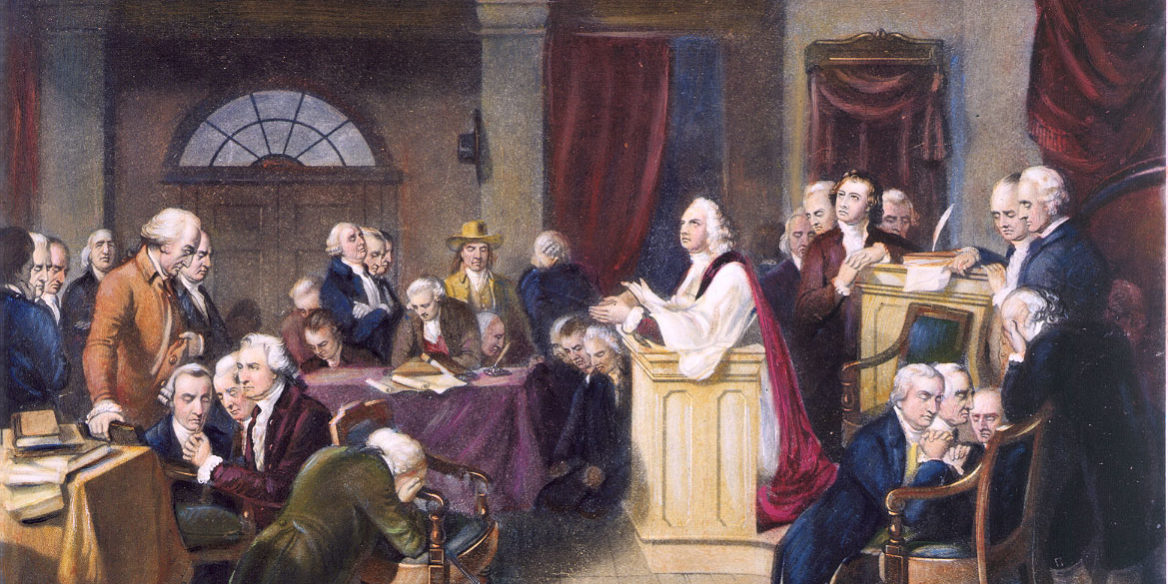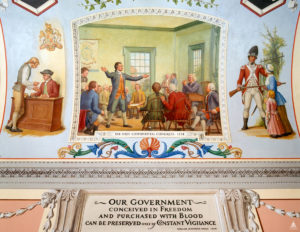 In Great Experiment Hall in the U.S. Capitol, Allyn Cox’s mural of the First Continental Congress of 1774 shows Patrick Henry making his remarks in Carpenter’s Hall. According to John Adams, Henry spoke on September 6, saying, “Government is dissolved… We are in a State of Nature… I hope future Ages will quote our proceedings with applause… The Distinctions between Virginians, Pennsylvanians, New Yorkers and New Englanders, are no more. I am not a Virginian, but an American.”
In Great Experiment Hall in the U.S. Capitol, Allyn Cox’s mural of the First Continental Congress of 1774 shows Patrick Henry making his remarks in Carpenter’s Hall. According to John Adams, Henry spoke on September 6, saying, “Government is dissolved… We are in a State of Nature… I hope future Ages will quote our proceedings with applause… The Distinctions between Virginians, Pennsylvanians, New Yorkers and New Englanders, are no more. I am not a Virginian, but an American.”
As the mural depicts, English government forced “taxation without representation.” To the right, a British soldier blocks a woman and her daughter, depicting “quartering of soldiers in peacetime.” Henry’s remark about being in a state of nature was critical, as was his famous line: “I am not a Virginian, but an American.” He did not mean that he had no allegiance to his state, but the crisis of the day demanded a higher level of unity to preserve their rights.
The Stamp Act Congress (1765) did not declare the source of colonial rights, but: “The Declaration and Resolves of the First Continental Congress was one of the most important forerunners of the Declaration of Independence and the declarations of rights found in the first state constitutions. Unlike the Resolutions of the Stamp Act Congress, it based the rights of the colonists not only on the principles of the English constitution and the colonial charters but also upon the law of nature.”
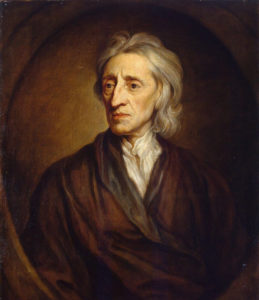 In Of Civil Government, Locke wrote that the state of nature is “a state of perfect freedom… within the bounds of the Law of Nature.” He continued, “Though this be a state of liberty, yet it is not a state of license… for Men being the Workmanship of one Omnipotent, and infinitely wise Maker… they are His property.” He followed with, “The state of nature has a law of nature to govern it.” The law of nature is meaningless if it has no limits. Though the law of nature is the law of the Creator, who is to say what the law of the Creator is? Locke’s premise of the law of nature was the Bible, beginning in Genesis, and it was called the law of revelation. Both are needed for a full accounting of the foundation of rights.
In Of Civil Government, Locke wrote that the state of nature is “a state of perfect freedom… within the bounds of the Law of Nature.” He continued, “Though this be a state of liberty, yet it is not a state of license… for Men being the Workmanship of one Omnipotent, and infinitely wise Maker… they are His property.” He followed with, “The state of nature has a law of nature to govern it.” The law of nature is meaningless if it has no limits. Though the law of nature is the law of the Creator, who is to say what the law of the Creator is? Locke’s premise of the law of nature was the Bible, beginning in Genesis, and it was called the law of revelation. Both are needed for a full accounting of the foundation of rights.
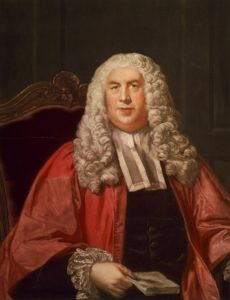 William Blackstone would confirm these two laws: “As man depends absolutely upon His Maker for everything, it is necessary that he should in all points conform to his Maker’s will. This will of his Maker is called the law of nature. For as God, when He created matter, and endued it with a principle of mobility, established certain rules… so, when He created man, and endued him with free will to conduct himself in all parts of his life, He laid down certain immutable laws of human nature, whereby that free will is in some degree regulated and restrained.” Due to man’s frailty of sin, Blackstone continued, “The benign interposition of divine providence… hath been pleased… to enforce its laws by an immediate and direct revelation. The doctrines thus delivered we call revealed or divine law, and they are to be found only in the Holy Scriptures.”
William Blackstone would confirm these two laws: “As man depends absolutely upon His Maker for everything, it is necessary that he should in all points conform to his Maker’s will. This will of his Maker is called the law of nature. For as God, when He created matter, and endued it with a principle of mobility, established certain rules… so, when He created man, and endued him with free will to conduct himself in all parts of his life, He laid down certain immutable laws of human nature, whereby that free will is in some degree regulated and restrained.” Due to man’s frailty of sin, Blackstone continued, “The benign interposition of divine providence… hath been pleased… to enforce its laws by an immediate and direct revelation. The doctrines thus delivered we call revealed or divine law, and they are to be found only in the Holy Scriptures.”
Patrick Henry, John Adams, and the other delegates had many differences of opinion. However, with the British Monarchy attempting to force them into submission in violation of their written charters and the British Constitution, they recognized it was time to appeal to a higher law they could agree upon. In doing so, they appealed, in essence, to the laws of nature and of nature’s God (or the law of nature and the law of God), as the Declaration would declare. It is important to understand that, according to the Bible, before there were any written laws, there was creation law. But God, in His mercy, also gave the written Law (or revelation) since man’s nature was fallen due to sin.
The delegates resolved to declare that, “The inhabitants of the English colonies in North-America, by the immutable laws of nature, the principles of the English constitution, and the several charters or compacts, have the following RIGHTS.” After listing these God-given rights that included life, liberty, property, representative government, trial by jury, petition, and separation of powers to name a few, they declared: “…In behalf of themselves, and their constituents, do claim, demand, and insist on, as their indubitable rights and liberties; which cannot be legally taken from them.”
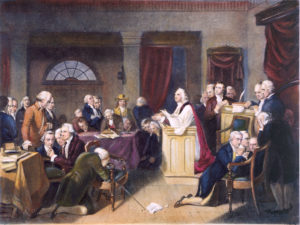 On September 7, the day after their deliberations began, they prayed to their Redeemer and appealed to the Law of Revelation, led by Rev. Jacob Duche. After reading from Psalm 35, he prayed: “O Lord, our Heavenly Father, high and mighty, King of kings and Lord of lords… look down, we beseech thee, on these our American States, who have fled to thee from the rod of the oppressor, and thrown themselves on thy gracious protection… for the righteousness of their cause… give them wisdom in council, and valor in the field. Defeat the malicious designs of our cruel adversaries…. All this we ask in the name and through the merits of Jesus Christ thy Son, our Savior. Amen.”
On September 7, the day after their deliberations began, they prayed to their Redeemer and appealed to the Law of Revelation, led by Rev. Jacob Duche. After reading from Psalm 35, he prayed: “O Lord, our Heavenly Father, high and mighty, King of kings and Lord of lords… look down, we beseech thee, on these our American States, who have fled to thee from the rod of the oppressor, and thrown themselves on thy gracious protection… for the righteousness of their cause… give them wisdom in council, and valor in the field. Defeat the malicious designs of our cruel adversaries…. All this we ask in the name and through the merits of Jesus Christ thy Son, our Savior. Amen.”
The Pilgrims found themselves in a similar situation when King James desired to “harry them out of the land,” and “shut up the ports against them” so they couldn’t leave. Being under a government that was forcing them into submission in violation of its own laws, they had no choice but to fall back upon the Creator (law of nature) as well as their Redeemer (law of revelation). Not all on board the Mayflower were believers, but they all could appeal to the Creator. The leaders who drafted the Compact had been taught by Pastor John Robinson the value of revealed law for church and state.
Without permission of the King, yet respecting his authority, the Pilgrims set up their government “in the name of God, Amen.” It resolved the cry of mutiny, brought them into harmony, but most importantly, appealed to the God of heaven. Resting on both the law of nature and laws of God, it said in part: “Having undertaken, for the glory of God, and advancement of the Christian faith, and honor of our King and Country, a voyage to plant the first colony in the northern parts of Virginia, do by these presents solemnly and mutually, in the presence of God, and one of another, covenant and combine our selves together into a civil body politic.” The evidence is clear that the Pilgrim laws subsequently formed rested on, as they wrote later, “the ancient platform of God’s law.”
May we, as Americans, understand that we must pray for our representatives at the local, state and federal levels, who realize the dangers of losing our rights, to appeal clearly and articulately to a higher law than the constitutional documents being ignored or corrupted. We must appeal to our Creator and His laws of nature, and for greater clarity to the Bible: the highest law. Both together – the laws of nature and of nature’s God – will provide us the greatest security and the wisest counsel!

